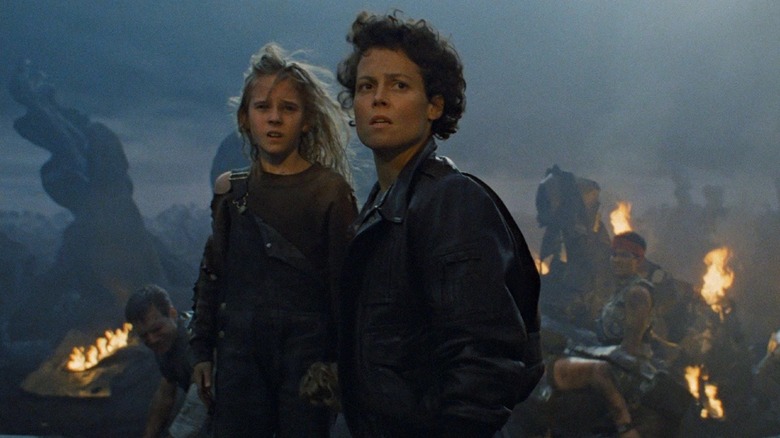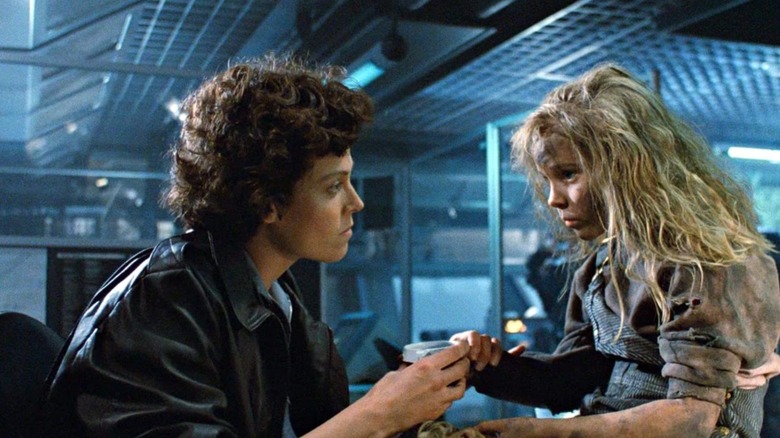Aliens Had To Trim Down An Essential Moment Between Ripley And Her Daughter
Ridley Scott's "Alien" comes very close to perfection. The 1979 space horror uses reined-in suspense to set up its terrifying premise, and once the Facehugger graces our screens, the anxiety is ramped up and sustained until the last minute. The astonishing kernel of realism that "Alien" embraces might have been tough to replicate, but James Cameron cooked up the massively satisfying "Aliens," a worthy sequel that raises the stakes to the extreme. Cameron's sequel did not need to recapture the singular aura of the original as it went for a completely different vibe: huge set-pieces, exaggerated, cool-as-heck fight sequences, and a dramatic emotional thread that ties the spectacle together. The return of Ellen Ripley (Sigourney Weaver) feels momentous, as we get to witness more of her no-nonsense badassery intertwined with measured vulnerability.
One of the most significant emotional threads that ground "Aliens" is Newt (Rebecca Jorden), the sole survivor from the Hadley's Hope settlement after a Xenomorph infestation tears the terraforming colony apart. After Newt is rescued, Ripley emerges as a surrogate mother figure, as she bonds with the traumatized kiddo and offers comfort before the Facehuggers attack the group again. This small yet essential moment cements their relationship, setting the stage for Ripley eventually risking her life to save the young girl. In the end, "Aliens" is about found family, the lengths parental figures will go to protect their children from harm, and how shared trauma can nudge people towards a more hopeful future.
However, Cameron and his team had to trim down a key aspect of Ripley's relationship with her biological daughter Amanda due to runtime constraints, leading to an overlooked facet that adds meaningful depth to an otherwise under-explored familial dynamic.
The story of Amanda Ripley in Aliens
Amanda is introduced in the "Aliens: Special Collector's Edition," where Ripley asks Carter Burke (Paul Reiser) about the whereabouts of her daughter after waking up in the medical center in Gateway Station. Burke hesitantly reveals that Amanda died at the age of 66, and Ripley clutches Amanda's photograph while mourning her promise to return home on her daughter's 11th birthday. Speaking to The Ringer in 2022, Gale Anne Hurd explained that this pivotal moment had to be trimmed out of the theatrical version due to runtime concerns:
"The seminal element of the script is her [Ripley] — the Joseph Campbell reluctant hero or, in this case, heroine. Sadly, the scene that we had to trim because of the running length [is] when she promises her own daughter that she'll be back for her birthday and she isn't. That was really the moment and the scene that created the drive that Ripley's character has toward not betraying another child, her essentially surrogate daughter, Newt."
Although Ripley's maternal instincts to protect Newt feel genuine even without this particular context, Amanda's presence injects tragedy into Ripley's experience with motherhood, as her daughter spent a lifetime awaiting her return and died before Ripley was rescued. The fact that Amanda died only two years after the rescuers found Ripley in stasis makes the ordeal even more tragic and adds pronounced impetus to her protectiveness towards Newt, another vulnerable child in need of parental warmth.
Vignettes of Amanda's backstory have been explored in the franchise video game "Alien: Isolation," where she joins a crew en route to Sevastopol after learning that the Nostromo's flight recorder containing Ripley's message has been found. The anxiety-inducing and claustrophobic gameplay style underlines Amanda's ability to fiercely fight and survive a crisis, evoking similarities with Ripley.

